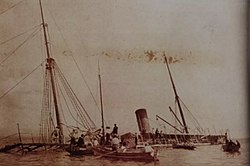Thousand Days' War
| Thousand Days' War (Guerra de los Mil Días) |
|||||||
|---|---|---|---|---|---|---|---|
 The sinking of the Lautaro (20 January 1902, Panama City). |
|||||||
|
|||||||
| Belligerents | |||||||
|
|
|
||||||
| Commanders and leaders | |||||||
|
Rafael Uribe Uribe Benjamín Herrera |
Próspero Pinzón Ramón González Valencia Pedro Nel Ospina |
||||||
| Casualties and losses | |||||||
| 120,000 | |||||||
The Thousand Days' War (1899–1902) (Spanish: Guerra de los Mil Días), was a civil armed conflict in the Republic of Colombia (including its then Department of Panama), between the Conservative Party, the Liberal Party and radical factions. During 1899 the ruling conservatives were accused of maintaining power by fraudulent elections. The situation was worsened by an economic crisis caused by decreasing international coffee prices. This mainly affected the opposition Liberal Party, which had lost power.
Throughout the 19th century, Colombia was a politically unstable country, a factor that evolved during 1886 into what became the main cause of the war. This was the year in which the 1863 constitution was suppressed and replaced by a more centralist and conservative document. The 1863 constitution had been criticized as a result of federalist excesses during the period in which the Liberal radicals were in power.
With the Regeneración (Regeneration) period and the creation of the 1886 constitution, the centralist regime only managed to aggravate the political problems. The governments of some departments soon began to complain about these problems to the central government. Poor political decisions also resulted in economic problems. The indigenous leader Victoriano Lorenzo had been fighting for Native American land rights and economic autonomy, and soon negotiated an alliance with the Liberal cause.
The war began as a result of confrontation between the Liberals and Conservatives. The Conservatives had used fraudulent elections to remain in power, and this resulted in much anger amongst the opposition. Additionally, President Manuel Antonio Sanclemente was too ill to rule the country, resulting in a power vacuum.
The intended date for the beginning of the civil war was October 20, 1899. However, due to the imprudence of some of the Liberal generals who wished to begin the war on October 17, it was changed. The reaction of many Liberals was hesitant, since they believed that they did not have sufficient numbers or organization. Despite this, the rebellion began in the municipality of Socorro, Santander, and the rebels awaited military reinforcements from Venezuela.
...
Wikipedia
